Revelation 2:12-17, Pergamum
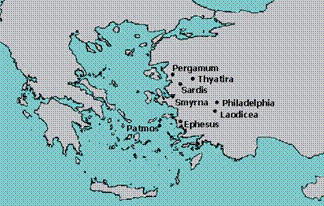 Pergamum
was a major city in western Asia Minor in New Testament times.
Pergamum
was a major city in western Asia Minor in New Testament times.
It lies in a spacious valley, sixteen miles from the Aegean Sea in what is today
the country of Turkey. In the centuries before
Christ, Pergamum was the capital of an independent kingdom. Its impressive temples,
library, and medical facilities made
Pergamum a renowned cultural and political center. By the time Revelation was
written, Pergamum had become part of the
Roman Empire, but because of its location and importance, the Romans used it
as an administrative center for the province
of Asia.
 Acropolis One of the seven churches addressed
in Revelation, the city of Pergamum
Acropolis One of the seven churches addressed
in Revelation, the city of Pergamum
became the center of a large kingdom in the 3rd century B.C. and retained its
status as a political and cultural leader into
the Byzantine period.
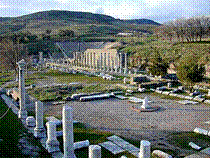 Aesclepium
The god of healing, Aesclepius, the serpent shaped idol, received worship in
Aesclepium
The god of healing, Aesclepius, the serpent shaped idol, received worship in
cultic centers around the Greek and Roman world. This large complex at Pergamum
was originally constructed in the 4th
century B.C. and became an official center in the the 3rd c. In the 2nd c.
A.D., Hadrian further developed the center and it
was added to the list of "wonders of the world."
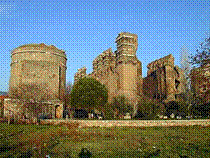 Serapeum
A temple to the ancient Egyptian god of the underworld was erected in
the lower
Serapeum
A temple to the ancient Egyptian god of the underworld was erected in
the lower
city of Pergamum. The Serapis cult was founded by Ptolemy I and was centered
in Alexandria. Held to be a god of healing,
particularly of blindness, Serapis was one of a number of Egyptian deities
worshiped in ancient Greece and Rome.
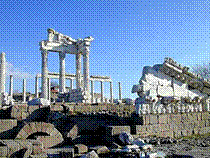 Temple
of Trajan Some impressive remains of this 2nd c. A.D. marble temple
dedicated to the
Temple
of Trajan Some impressive remains of this 2nd c. A.D. marble temple
dedicated to the
emperor have been restored. It sits next to the library which housed 200,000
volumes and was the second largest in the ancient world
after Alexandria. Parchment was invented in Pergamum after relations with Egypt
soured and papyrus became difficult to obtain.
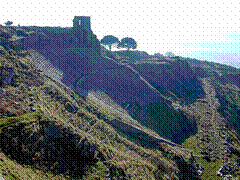 Theater
This theater is one of
the steepest ones preserved in Turkey today. It sits on the edge
Theater
This theater is one of
the steepest ones preserved in Turkey today. It sits on the edge
of the city's acropolis. It was built in the Hellenistic period and altered
in the Roman period. Seating capacity of this theater is
estimated at 10,000 people.
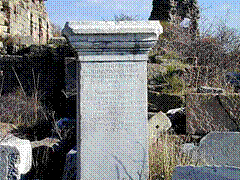 White Stone
This white stone at Pergamum with names inscribed reminds of Jesus' words:
White Stone
This white stone at Pergamum with names inscribed reminds of Jesus' words:
"And to the angel of the church in Pergamos write...He that hath an ear, let
him hear what the Spirit saith unto the churches;
To him that overcometh will I give to eat of the hidden manna, and will give
him a white stone, and in the stone a new name written,
which no man knoweth saving he that receiveth it" (Rev 2:12, 17).
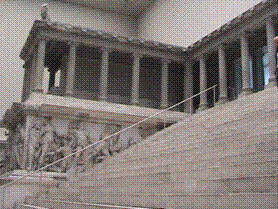
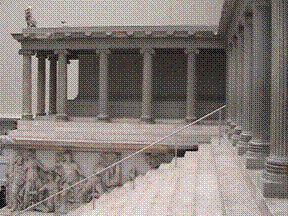
This altar of Zeus
was taken from Pergamum in the 1800’s to the Berlin Museum.
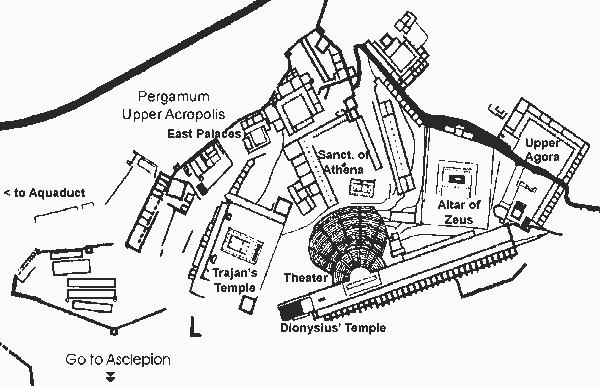 Pergamum
was 20 miles in from the
Pergamum
was 20 miles in from the
Aegean Sea It was a wealthy city. The gods of the city where Athena, Asclepius,
Kionysus, and Zeus. The official goddess of
protection was Athena Nicephorus (“who brings victory”) It was famous for its
library of 200,000 volumes. Marc Anthony had
sent it as a gift to Cleopatra in Egypt. There was a university here. Galen,
(129-199 AD) the doctor from Pergamum wrote that
there were 40,000 citizens and about that many women and slaves also. He estimated
the population to be about 120,000.
Galen was the most famous citizen. He began his medical practice by treating
the gladiators and eventually became the
personal physician for emperor Marcus Aurelius in Rome. During a time of difficult
relations with Egypt Pergamum’s papyrus
supply was cut off and they developed a writing material called parchment made
from thin sheets of goat skin.
2:12 “To the angel of the church
in Pergamum write:
2:12 “These are the words of him
who has the sharp, double-edged sword.”
A reference from 1:16. In the Greek it is written “the one having the sword
the two-edged the sharp”
The articles are used to emphasize each of these character traits.
The sword represents the word of God. Psalms “Sword” is “romthaian” and refers
to the large spear-like sword with two edges
used for both cutting and piercing
The other word for sword is “machaira” and refers to a short sword or a dagger.
Archeologists identify a sword that is sixteen inches or shorter as a machaira.
The larger “romthaian” is found in:
Lk. 2:35 Rev. 1:16 Rev. 2:12 Rev. 2:16 Rev. 6:8 Rev. 19:15 Rev. 19:21 Hebrews
4:12 (machaira) Ephesians 6:17 (machaira)
Psalm 52:2 Psalm 57:4 Isaiah 49:2
About the Messiah it says, “He has
made my mouth like a sharp sword.”
The sword represents:
1) The reality of the word of God
2) The truth of the word of God The believers of Pergamum must face and embrace
the reality and the truth of the Word in order
to stand against conforming to the pattern of the world in Pergamum.
This is not a positive introduction.
It is a threatening introduction for these believers.
2:13 “I know where you live—where
Satan has his throne.”
“live” is permanent residence.Zeus’ altar was a colonnaded court in a “U”
shape.
It was 120 feet by 112 feet. The podium of the altar was 18 feet high.
There was great rock carving that ran 446 feet along the base that depicted
the battle of the gods verse the giants.
This altar set Pergumum apart from the other Asaian cities.
The throne of Satan (dragon) is mentioned again in 13:2 and 16:10
2:13 “You did not renounce your
faith in me, even in the days of Antipas, my faithful witness, who was put to
death in your
city—where Satan lives.”
Antipas means “against all.”
A late legend says that Antipas was roasted in a bronze bowl during the reign
of Domitian.
He is given the same title as the Lord from 1:5 “faithful witness.”
These believers had been true to God in testing but had failed in other ways.
2:14 “Nevertheless, I have a few
things against you:”
2:14 “You have people there who hold to the teaching of Balaam, who taught
Balak to entice the Israelites to sin by eating food sacrificed
to idols and by committing sexual immorality.”
The “teaching” is not a body of doctrine here but an activity .
Number 25:1 Balaam showed Balak how to lure God’s Israelites into sexual immorality
and idolatry.
The Israelites violated themselves and lost their spiritual power. God intervened
and would not let Israel fail.
He chastised them by killing 24,000 and had Moses execute the leadership that
fell (Num.25:4).
This punishment stopped a behavior that would have eventually destroyed much
more of Israel and the continued practice would have eliminated Israel
from God’s plan.
Pergamum was living as Christians mixed into a worldly system. The problem seems
to be accommodation was seen as the best policy in dealing with the world. Compromise
was taught.
They believed they could coexist with Rome peacefully.
Jude 11, “Woe to them! They have
taken the way of Cain; they have rushed for profit into Balaam’s error; they
have been destroyed in Korah’s rebellion.”
1) Way of Cain. . .devised his own way of worship and when rejected by God Cain
lashed out at the one who was obedient to God.
2) Balaam’s error. . .under the appearance of serving God taught others to behave
contrary to God’s will for personal financial reward
3) Korah’s rebellion. . .rejected God’s chosen leader and urged the people to
accept men whose authority came only from men.
Cain rejected God’s way of worship and killed the obedient.
Balaam turned from God’s word for money and destroyed others spiritual power
Korah rejected authority established by God, those who followed
were consumed
2 Peter 2:15-16,
a) eyes full of adultery
b) seduce unstable
c) experts in greed
2:15 “Likewise you also have those
who hold to the teachings of the Nicolaitans.”
The Nicolaitans are the same group as those who followed Balaam and Balak.
Just a different time. Nicolaitans taught that Christians could participate
in worldly practices such as idolatry and sexual immorality.
They seduced the believers who where not fully stabilized in the word of God.
The majority of the believers did not participate in this teaching and behavior,
but they tolerated those who did.
2:16 “Repent therefore! Otherwise,
I will soon come to you and will fight against them with the sword of my mouth.”
“Repent” is “metanoeo” which means a change of mind that results in a change
of behavior.
Pergamum’s problem is the opposite
of Ephesus.
1) The Ephesians rejected anyone did not hold to their doctrines.
2) Pergamum accepts anyone in the name of tolerance.
Jesus is going to strike this church
in order to preserve it just like he struck Israel in Balaam’s day to stop the
immorality and preserve the Jewish culture.
The heretics would be struck for their sin and the others would be struck for
tolerating the heretics behavior.
Notice the switch in pronouns from “you” to “them”
1 Corinthians 5:6-7 Paul warns the
church for accepting a man who was clearly living in sin.
2 Timothy 2:23-26
2:17 “He who has an ear, let him
hear what the Spirit says to the churches.”
2:17 “To him who overcomes, I
will give some of the hidden manna.
Who is it that overcomes?
1 John 5:4-5
Manna was given to Israel to eat
in the wilderness
The manna was placed in the ark of the covenant in Exodus 16:33.
The manna in the ark represents Jesus, the bread of life.
(John 6:48-51 Jesus provides spiritual substance for those who are believers.
We just need to take and eat it.
This promise of the hidden manna is for today.
Only with the nourishment from this hidden manna, the spiritual blessings in
Christ (Ep. 1:3) do we have the strength to overcome the world.
Jesus is the unseen source of the believer’s spiritual strength.
Israel received physical food, the church receives spiritual food.
The people of Pergemum would be like the people of Jesus day in John 6 who want
physical food but did not find any value in spiritual food.
Psalm 78:24,25
See Esau in Hebrews 12:16, sexually
immoral or godless is the selling of your spiritual birthright for a single
meal.
2:17 “I will also give him a white
stone with a new name written on it, known only to him who receives it.”
Here is a promise for eternity. (According to the rabbinic lore precious stones
fell form heaven with the manna.)??
Romans awarded white stones (a tessera)
to the winners in athletic contests.
(White stones were also used to
cast a vote of acquittal, a token of admission, membership or recognition, an
token of gladiatorial discharge
who won the admiration of the public and had been allowed to retire from further
com bat. There where also little tablets of wood, metal, or stone
distributed to the poor in Rome by the emperors to insure a regular supply of
corn.)
This white stone would have the athletes
name inscribed on it.
This white stone with the athletes named became the athletes ticket to special
awards banquets or the messianic feast.
The winners in the spiritual battle here on earth will have special entrance
into heavens events.
The new name is unknown until it
is received. Dt. 29:29, “The secret things belong to the Lord our God, but the
things revealed belong to
us and to our children forever, that we may follow all the words of this law.”
New is the word “kainos” and means
new in quality.
Isaiah 62:2 “a new name”;
65:15 “a different name”
The new name symbolizes the individual’s
entry into a new life, status, or personality.
How this name was earned can only be understood by the one who receives it.
Your victory will be unique with you.
Deviating from the truth of the word of God compromises your ability to live
a godly life (do spiritual warfare) in this life.
 Pergamum
was a major city in western Asia Minor in New Testament times.
Pergamum
was a major city in western Asia Minor in New Testament times.  Acropolis One of the seven churches addressed
in Revelation, the city of Pergamum
Acropolis One of the seven churches addressed
in Revelation, the city of Pergamum  Aesclepium
The god of healing, Aesclepius, the serpent shaped idol, received worship in
Aesclepium
The god of healing, Aesclepius, the serpent shaped idol, received worship in
 Serapeum
A temple to the ancient Egyptian god of the underworld was erected in
the lower
Serapeum
A temple to the ancient Egyptian god of the underworld was erected in
the lower  Temple
of Trajan Some impressive remains of this 2nd c. A.D. marble temple
dedicated to the
Temple
of Trajan Some impressive remains of this 2nd c. A.D. marble temple
dedicated to the  Theater
This theater is one of
the steepest ones preserved in Turkey today. It sits on the edge
Theater
This theater is one of
the steepest ones preserved in Turkey today. It sits on the edge  White Stone
This white stone at Pergamum with names inscribed reminds of Jesus' words:
White Stone
This white stone at Pergamum with names inscribed reminds of Jesus' words:

 Pergamum
was 20 miles in from the
Pergamum
was 20 miles in from the